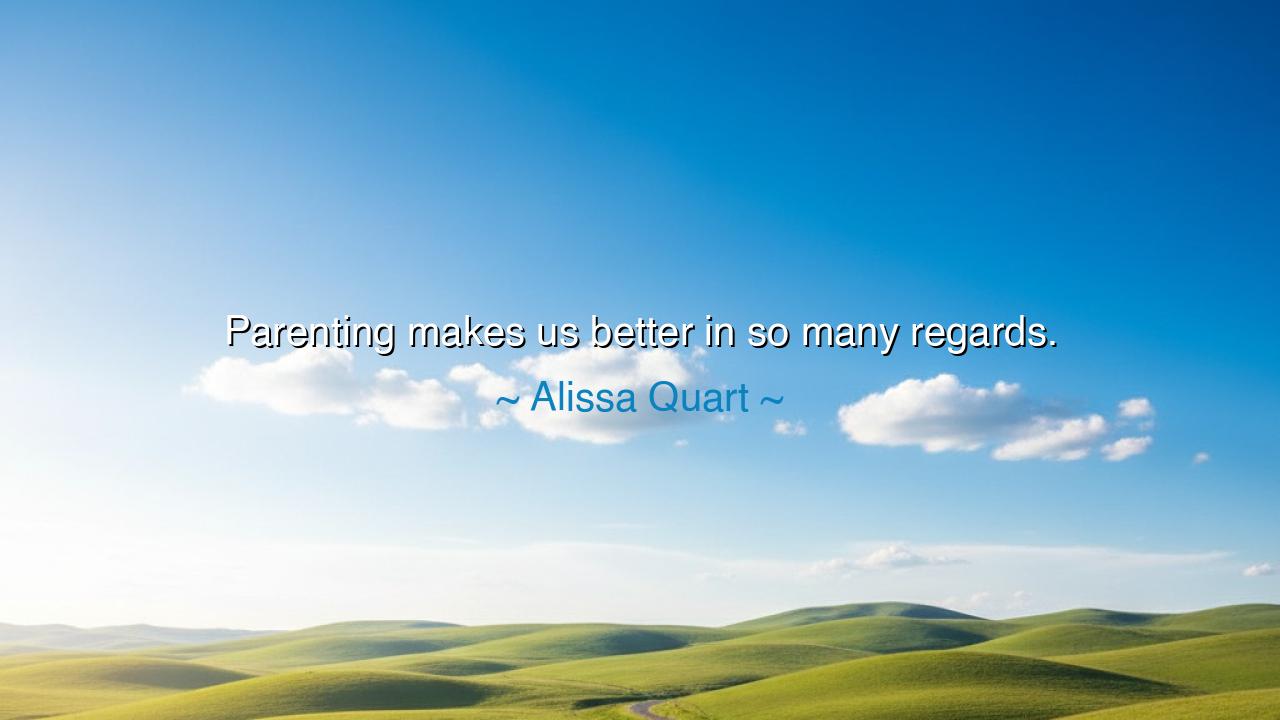
Parenting makes us better in so many regards.






The words of Alissa Quart shine like a torch passed down from one generation to the next: “Parenting makes us better in so many regards.” These words may seem simple, but within them lies a truth as deep as the roots of humanity. For to take on the mantle of parenting is to be reshaped, refined, and tested, until the soul that once lived only for itself is expanded to carry the weight of another life. It is not only the child who grows under the watch of the parent—the parent too is transformed, tempered like steel in the fire of responsibility and love.
The ancients knew that to care for another was to be reborn. In their stories, the hero who carried the wounded, or the elder who raised the orphan, always returned changed—more patient, more enduring, more wise. So too does parenting carve new dimensions into the human heart. Where once there was impatience, now there is endurance. Where once there was selfishness, now there is sacrifice. Where once there was only fear for oneself, now there is courage for another. Quart’s words point to this holy paradox: in serving the child, the parent is secretly served by life itself, trained into greater strength.
History offers us examples that thunder with this truth. Consider Frederick Douglass, who, though not a father by blood to many, became a parental guide to generations. Having risen from the chains of slavery, he nurtured others with his wisdom and strength, teaching them to claim dignity and freedom. In this role, he himself became greater, not only as an orator but as a human being whose capacity for compassion and resilience deepened. The work of guiding, like the work of parenting, refined him into more than he would have been alone.
The daily labors of parenting—the sleepless nights, the unending questions, the struggles to protect and to provide—are often seen as wearisome. Yet within these very struggles lies the refining fire. For patience is not born in ease, but in frustration. Generosity does not bloom in abundance, but in sacrifice. Courage does not grow in safety, but in danger. Parenting forces the soul to grow in directions it would never choose on its own, stretching it toward virtues that otherwise might remain dormant.
Quart’s words also remind us that this transformation is not narrow but wide: it makes us better “in so many regards.” It improves not only the way we love our children, but also the way we treat others, the way we endure hardship, the way we understand the fragile beauty of life. Parents often say they never knew the depth of their own strength until they saw their child in need. They never knew the breadth of their own compassion until they had to guide someone utterly dependent on them. In this way, the role of parent echoes outward, shaping not just the family, but the community, the nation, and the world.
The lesson here is luminous: embrace parenting not as a burden alone, but as a path of transformation. Do not measure its value merely by the achievements of the child, but also by the growth of the parent. In every moment of trial, see also the opportunity to become more patient, more courageous, more wise. The parent who endures with love walks away stronger than before, even if they do not see it at once.
Practically, this means parents should remind themselves, in the midst of exhaustion, that they too are being shaped. Each challenge is a lesson, each sacrifice a chiseling of the soul, each moment of love a widening of the heart. And for those who are not parents, there is still wisdom here: whenever you nurture, guide, or sacrifice for another, you are walking the same path, being made better in the act of care.
Thus, let Quart’s words endure like a proverb: “Parenting makes us better in so many regards.” It is a calling that refines, a labor that ennobles, a fire that purifies. Though the world crowns its rulers and praises its warriors, the greatest transformation often occurs in the quiet chambers of the home, where love and labor join hands to make mortals into something greater than themselves.






AAdministratorAdministrator
Welcome, honored guests. Please leave a comment, we will respond soon